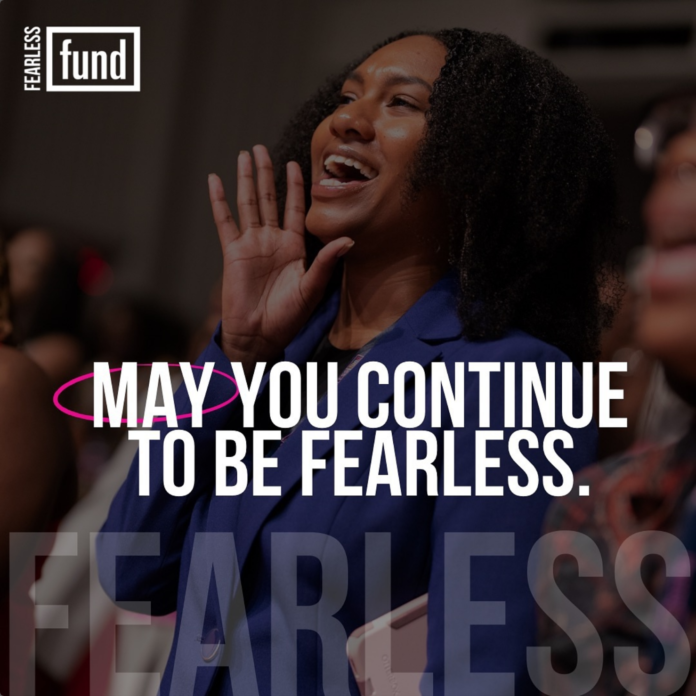By Merdie Nzanga/Originally published by The 19th
Bettina Benson was getting off a red-eye flight from Los Angeles, on her way home to Marietta, Georgia, when she received an email that altered the course of her business. She was a recipient of a 2023 grant from venture capital firm Fearless Fund, established to help Black women small business owners gain access to capital.
Benson, a self-taught designer, started the online clothing brand Chloé Kristyn in 2016. For her, receiving the grant was about alignment between the fund’s goals and her own mission: Fearless Fund understood the challenges Black women entrepreneurs face, she said.
“Running a business is inherently challenging, and as a woman of color, especially being self-funded and with the gaps in funding, challenges can be even more intense,” she said.
Black women entrepreneurs find it harder to access traditional forms of funding from banks and as well as grants and venture capital funding, according to a study conducted by Crunchbase, a company that provides statistics about businesses.
White men receive a disproportionate amount of venture capital funding when compared with women business owners. The funding gap between White men and Black women entrepreneurs is even bigger, with Black women receiving less than 1 percent of venture capital funding, the report found.
Founded by Arian Simone and Ayana Parsons in 2018, Fearless Fund has raised over $25 million to invest in Black women-owned businesses. The small venture capital firm has also awarded more than 350 grants through a number of different programs, one of which is the Strivers program that awards $20,000. Those grants have gone to Black women business owners to help close the racial disparity and give them the same opportunities for economic advancement, according to Simone.
But now, Fearless Fund’s ability to provide grants exclusively to Black women is at risk.
Edward Blum, a conservative activist who led the fight to strike down race-based affirmative action at colleges and universities, has sued Fearless Fund in federal court. Blum and his organization, the American Alliance for Equal Rights, claim that the fund’s Fearless Strivers Grant contest discriminates against other races and violates the Civil Rights Act of 1866, a law created during Reconstruction to support Black people, particularly those who had been previously enslaved.
In the months ahead, a group of judges on the U.S. Court of Appeals for the 11th Circuit in Florida will determine whether to stop Fearless Fund from awarding the $20,000 grants to Black women-owned businesses while the case is making its way through the legal system.
The lawsuit is part of a bigger conversation that worries civil rights activists across the country. They fear that if the Fearless Fund’s grant contest is struck down, it could also be a threat to other organizations focused on helping historically disadvantaged groups. The American Alliance for Equal Rights’ suits are just part of the effort by right-leaning groups to block diversity, equity and inclusion programs. America First Legal, an organization founded by Stephen Miller, who advised former President Donald Trump, has sued fintech firm Hello Alice over its grant to Black-owned small trucking companies.
Benson and other women who have benefited from Fearless Fund grants say the program has been life-changing.
Before receiving the grant, Benson had challenges with funding inventory for wholesale orders, marketing and attracting the right talent. She was in the process of filling some “pretty significant wholesale orders” when the funds arrived, providing a much-needed buffer.
“You fill those orders and then you get paid, but you have to have funds to be able to invest in production and your material,” Benson said.
The fund has allowed her business to grow, she said; she has even launched a new clothing line.
Janell Norris, CEO and founder of Selfie Skin Co., a skincare brand aimed at Black women, had tried for a grant from Fearless Fund a few times before she got one in July. She was in the process of recording a video at her friend’s house for another grant application when she learned that she was in the final round of the selection process.
Her friend still had the camera rolling when Norris received the news and cried tears of joy.
Norris received a $10,000 Fearless Fund grant, through a different program than the Strivers one being targeted by Blum. The money did not just impact her business, it also created opportunities for those around her, she said. It allowed her to expand her products from two to six and get help with both project management and marketing.
“I don’t think that people realize that when one brand gets a grant, it’s not just that one brand, you’re really supporting an ecosystem of other women minority-owned businesses,” she said.
Norris credits Fearless Fund for helping her brand gain visibility through the venture capital firm’s website, as well as allowing her to invest in organizations that serve underprivileged people, and her employees.
But not long after she received the grant, she said, uncertainty set in. A friend pointed out Blum’s lawsuit after she posted about the grant on social media. She worries about the entrepreneurs who were planning to apply for grants in the coming years.
“For me, it was OK, I got rejected, but you know what, I’m gonna just try it again next year, and I’m gonna work on it throughout the year until it comes back around,” Norris said. “To the entrepreneur who got that rejection in 2023, there’s nothing to look forward to in 2024 because someone has decided to attack programs that are beneficial to women of color.”



































